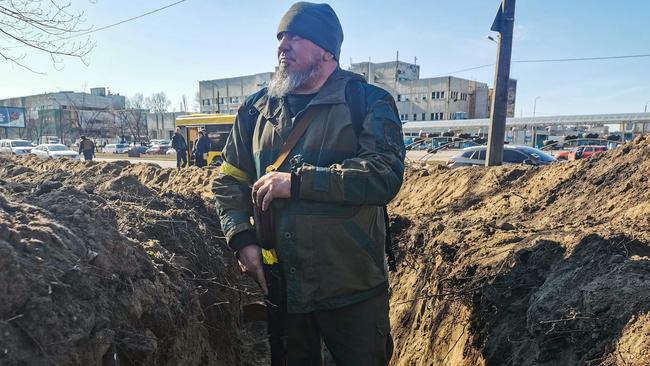Ex-navy chief Tim Barrett urges safeguards for commercial shipping as Ukraine hits supply chain
Australia’s commercial shipping is gravely exposed by fallout from the war in Ukraine and needs federal protection on national security grounds, a former navy chief has warned.

Australia’s commercial shipping is gravely exposed by the global fallout from the war in Ukraine and needs federal government protection on national security grounds, a former navy chief has warned.
The blunt warning by Vice-Admiral (retired) Tim Barrett comes as the nation’s peak shipping body has sent a letter to all its members, including Shell, BP and Origin Energy, warning the ‘‘stark reality check” of the Ukraine war has exposed Australia’s “supply chain vulnerabilities”.
The nation has only 13 Australian-flagged cargo ships, down from 100 in the 1980s, leaving the country’s shipping supplies at the mercy of ships controlled by other countries, meaning that in times of global crisis their availability cannot be guaranteed.
Sanctions on Russia over its invasion of Ukraine have already unsettled global shipping, with Russian vessels banned from some ports amid fears access to cargo ships and shipping routes could be jeopardised if the conflict widens.
This could risk Australian supply chains for a vast range of products reliant on global shipping, including fuel, medicine, fertilisers and construction materials.

The letter from Maritime Industry Australia Limited CEO Teresa Lloyd, sent to the group’s 78 members on Tuesday, calls on the government to urgently guarantee the survival of an Australian-flagged commercial shipping fleet on national security grounds.
“The unfortunate events in the Ukraine are a stark reality check that the global stability of the past few decades is anything but guaranteed into the future,” it states. “We have been raising the alarm regarding the urgent need to secure Australia’s shipping industry, noting the sovereign vulnerability associated with having much of our sea transport capability performed by foreign entities.”
Vice-Admiral Barrett, chief of navy in 2014-18, said the government needed to take action to protect shipping, given the uncertainty created by the fallout from the Ukraine conflict.
“What is happening now in Ukraine and Europe is bringing to light the parlous and fragile state of Australian shipping,” he told The Australian. “Indirectly, what happens in Ukraine will have enormous bearing on supply chain issues within Australia when it deals with shipping and the maritime industry itself.”
In a crisis, a government can call on Australian-flagged ships to be used to secure supplies on national security grounds, but it has no control over foreign-flagged fleets, which comprise almost all cargo ships in and out of Australia.
The steep decline of Australia’s sovereign commercial shipping industry has occurred because it is cheaper to use foreign-flagged carriers to transport goods. Other developed countries have slowed the decline by introducing favourable tax and regulatory regimes or direct subsidies to ensure a minimum number of cargo ships operates under their own flags, but successive Australian governments have let the market rule and not intervened to protect Australian-flagged carriers.
“No one went quite as hard with the economic rationalist approach as did Australia,” Ms Lloyd said. “Other nations have identified … a national security benefit to retaining control over their shipping industry so they put in place very competitive regimes.”
The MIAL is calling on the Coalition to set up a taskforce to determine how best to secure the country’s sovereign capability in commercial shipping. It also wants the government to subsidise 20 new flag carriers to “kickstart” the industry and to implement the same favourable tax and regulatory settings other countries enjoy.
A spokesperson for Deputy Prime Minister and Transport Minister Barnaby Joyce said the government understood the importance of the shipping industry and was “committed to ensuring Australia has a robust maritime supply chain”.
However, the security of commercial shipping in the wake of the Ukraine crisis is likely to become an election issue, with Labor already promising to set up a shipping taskforce to find ways to protect the sector.








To join the conversation, please log in. Don't have an account? Register
Join the conversation, you are commenting as Logout